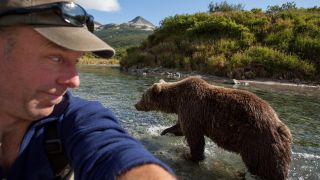What Do Wild Animals Really Think Of Humans
Humans are practically defenseless. Why don't wild fauna assault us more?

"They are more afraid of you than you are of them" is a proverb that is often used to reassure hikers that even large predators, such as bears and pumas, pose little threat to united states of america. Merely humans are slower and weaker than these animals, then what stops these beasts from snacking on every clothed ape they come across?
There are a few probable reasons why they don't attack more oft. Looking at our physiology, humans evolved to be bipedal — going from moving with all four limbs to walking upright on longer legs, according to John Hawks, a paleoanthropologist at the Academy of Wisconsin-Madison.
"There is a threat level that comes from being bipedal," Hawks told Live Science. "And when nosotros await at other primates — chimpanzees, gorillas, for instance — they stand to express threats. Condign larger in appearance is threatening, and that is a really like shooting fish in a barrel manner of communicating to predators that you are trouble."
Related: How many early human species existed on Earth?
Bipedalism may make humans appear bigger and therefore more threatening to other species, only it besides has disadvantages. Information technology is typically slower to move on two legs than on four, pregnant humans have abandoned whatsoever pretext of outrunning whatsoever iv-legged brute, according to Hawks.
"Information technology's sort of similar a bluff," Hawks said. "It'due south similar, 'I'yard walking around; I'chiliad tough; I'g showing where I am on a mural.'" Predators see the upright stance and assume humans are tougher than we actually are, according to Hawks. Notwithstanding, even if they were to call our bipedal bluff, predators have other reasons to leave united states lonely.
How common are wild animal attacks?
A 2019 study published in the journal Human–Wildlife Interactions found that about eight people die annually in the U.South. from wild beast attacks and near of these deaths are due to venomous snake bites.
Larger primates, such as humans and chimps, live in groups and adopted the strategy of aggressively defending themselves confronting threats, which unremarkably works against predators, Hawks said. Being social has therefore helped keep us rubber, along with the benefits of bipedalism.
As human being engineering science advanced, we adult an arsenal of advanced weapons, such as bows and guns, that could exist used from a distance. With these weapons, humans became so mortiferous that they began taking the fight to predators.
Another reason humans are rarely attacked by large wildlife is that their numbers have declined. "We've been trying to essentially clear the landscape that we use of large predators for a very long time," Justin Suraci, lead scientist in community environmental and conservation biology at Conservation Science Partners, a nonprofit conservation science organization based in California, told Live Science.
Large predators and their habitats suffered great losses in the United States before and into the 20th century, earlier the passing of the Endangered Species Act of 1973, Suraci noted. For example, humans hunted, trapped and poisoned wolves (Canis lupus) to near extinction, Live Science previously reported, and pumas (Puma concolor) were wiped out of the unabridged eastern half of North America, except for a pocket-size population in Florida, according to the International Marriage for Conservation of Nature.
Related: What'southward the first species humans drove to extinction?
Predators living in other areas that are heavily populated by humans take faced similar problems. Co-ordinate to Suraci, the animals that have escaped homo menace likely learned to go wary of our species. "For very logical reasons, some of these larger predators have a healthy fear of humans in the same style that any prey species would fear its predators," Suraci said.
In a 2019 study published in the periodical Ecology Letters , Suraci and his colleagues played recordings of homo voices through remote speakers in the Santa Cruz Mountains of California. The study showed that the audio of humans talking was plenty to scare away pumas and several smaller predators, such every bit bobcats (Lynx rufus).
The recordings were designed to simulate beneficial chat and consisted generally of Suraci and his friends reciting poetry and passages from books. The effect was so strong, the recordings had a similar effect to removing predators from an ecosystem altogether, with reduced predator activity assuasive pocket-sized, would-be prey animals, similar mice, to forage more than than they unremarkably would.
Suraci thinks this fearfulness that predators accept of humans could also have an upside: It could aid foreclose conflict betwixt humans and wildlife. Big predators need a lot of space, and in a human-dominated world, they need to exist able to live alongside humans without conflict.
"The fright of humans that a lot of these predators show is really positive in that calorie-free," Suraci said. "Information technology gives us some opportunity to potentially share spaces with these animals — to go hiking in places where pumas, bears and wolves all be, without experiencing any negative impacts."
Put another fashion, wild predators' "healthy fear" of humans may assistance the states coexist, "as long as nosotros're witting about their presence," Suraci said. Indeed, it's important to be smart while hiking in regions where large predators live. For instance, in comport state, people should hike in groups and periodically yell "Hey bear," to requite animals fourth dimension to exit the vicinity earlier an run across, Alive Science previously reported.
Originally published on Alive Science.
Source: https://www.livescience.com/why-predators-dont-attack-humans.html
Posted by: partainovertutremew.blogspot.com

0 Response to "What Do Wild Animals Really Think Of Humans"
Post a Comment